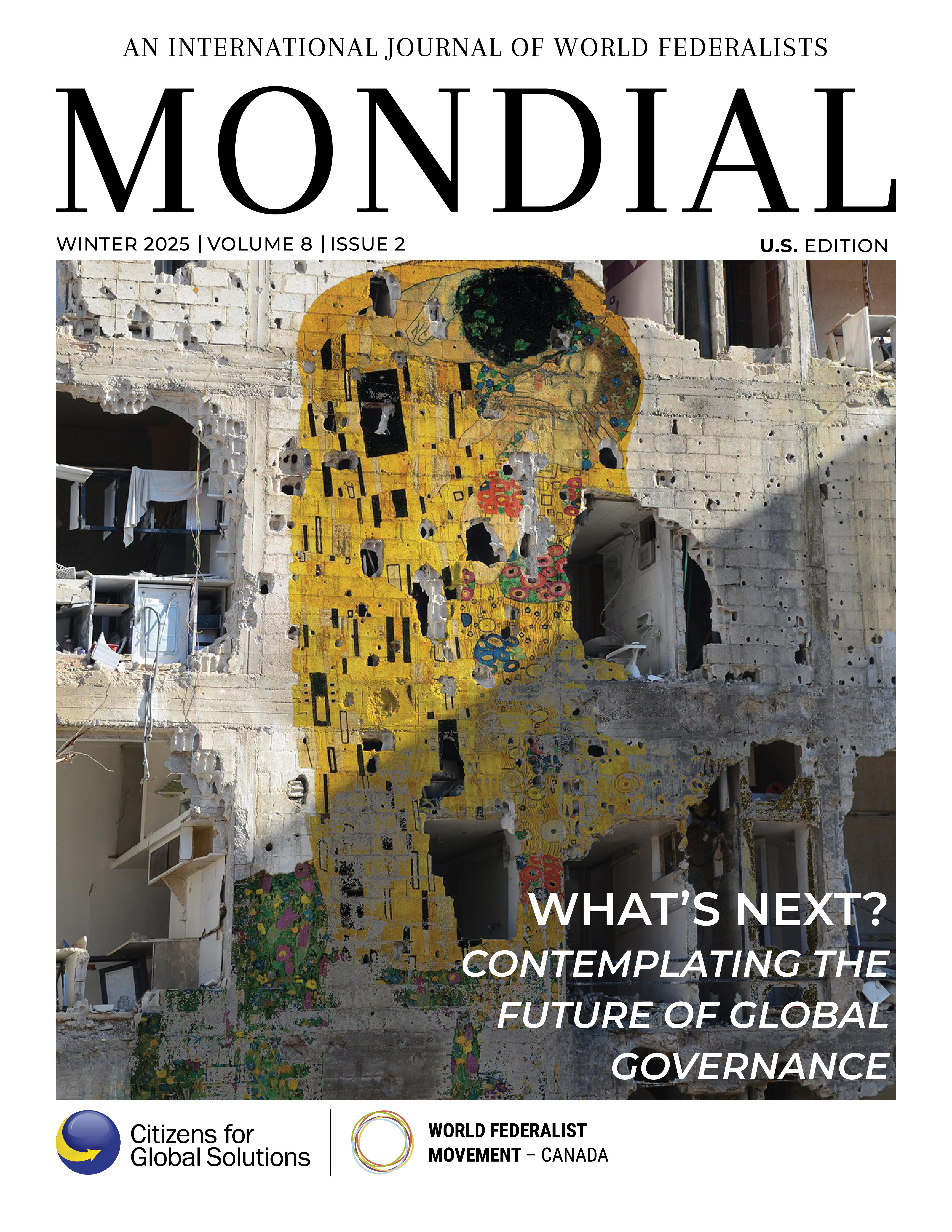Mondial Article (Winter 2025)
Addressing the Crisis of Sexual Exploitation and Abuse in UN Peacekeeping Operations through Mobile Gender Courts

Amarilys Delayla Torres-Nuñez
Amarilys Delayla Torres-Nuñez is an Anthropology and Zoology major at Ohio Wesleyan University and a proud first-generation college student. Driven by a passion for addressing complex cultural challenges, Amarilys aspires to a career focused on creating solutions for deep-rooted societal issues that impact communities around the world. With a strong commitment to raising awareness about critical topics like mental health, economic inequality, and women’s rights, Amarilys is dedicated to shining a light on social issues that demand public attention.
For decades, United Nations (UN) peacekeeping operations have symbolized hope and stability in some of the world’s most fragile regions. Established to maintain peace, uphold human rights, and assist nations transitioning from conflict, these missions play an integral role in global security. Yet a troubling shadow looms over them: persistent allegations of sexual exploitation and abuse (SEA) by peacekeepers. Despite the adoption of a zero tolerance policy in 2003 and numerous reports exposing the issue, SEA remains an alarming and persistent problem. In 2023 alone, more than 750 allegations of SEA were reported—220 more than in the previous year. These numbers highlight systemic failures within peacekeeping operations and underscore the urgent need for reforms to deliver justice for victims and accountability for perpetrators.
Peacekeepers are deployed to protect vulnerable communities in conflict and post-conflict zones, often where local systems are too fractured to provide adequate security or justice. However, the power imbalance between peacekeepers and the communities they serve has led to instances where protectors become perpetrators. This paradox not only violates the trust placed in peacekeeping operations but also perpetuates cycles of harm and exploitation.
A significant barrier to accountability is the immunity granted to peacekeepers in host states. Under current frameworks, troop-contributing countries retain criminal jurisdiction over their personnel. This arrangement, while intended to protect peacekeepers in dangerous environments, has proven to be a significant obstacle in prosecuting offenders. For instance, in 2015, 43 peacekeepers from Burundi were accused of SEA in the Central African Republic (CAR), yet none faced criminal punishment. This reflects both the systemic shortcomings of the current accountability structure and the cultural and institutional barriers within troop-contributing countries.
One of the most insidious forms of SEA is “survival sex,” where vulnerable individuals are coerced into exchanging sex for necessities such as food, shelter, or medical aid. In post-conflict settings, where economic desperation is rampant, such exploitation strips individuals of their agency and dignity. During the UN Mission in Haiti, numerous cases of survival sex were reported. Women were left raising children fathered by peacekeepers, often in extreme poverty and without support. One mother shared her despair: “My depression deepens every time my child complains of hunger.” The psychological scars and social stigmatization faced by these women and their children underscore the profound human cost of SEA.
Despite its prevalence, survival sex is often neglected in international legal frameworks and accountability measures. The Committee on the Elimination of Discrimination Against Women (CEDAW) has highlighted the issue, but its recommendations have largely focused on prevention rather than prosecution. This lack of a clear legal mandate contributes to a culture of impunity, leaving survivors without justice or recourse.
The UN has taken steps to address SEA, beginning with the “Zeid Report” in 2005 prepared by the UN Special Committee on Peacekeeping Operations. This report documented widespread exploitation and provided recommendations for improved investigations and victim compensation. However, it fell short of addressing the root causes of SEA, such as the immunity conundrum. Subsequent efforts, including the Independent Panel Review in 2015 and the Security Council’s adoption of a resolution on SEA in 2016, have reinforced the expectation that troop-contributing countries investigate and prosecute offenses. Yet, the reliance on member states to uphold these responsibilities has proven inconsistent and insufficient.
Cultural and systemic challenges within troop-contributing countries further exacerbate the issue. In some cases, patriarchal norms and the normalization of sexual violence hinder effective prosecution. For example, in Burundi, where cultural stigmas and institutional weaknesses are pervasive, none of the 43 accused peacekeepers in CAR faced criminal sanctions. This underscores the need for an alternative mechanism to address SEA allegations and ensure justice.
One promising solution lies in the adaptation of mobile gender courts, as seen in the Democratic Republic of Congo (DRC). These courts, operating within local justice systems, have successfully prosecuted cases of sexual violence with a 75% conviction rate for sexual crimes between 2009 and 2011. In 2011, a mobile court in the city of Fizi on the eastern border of the DRC prosecuted and convicted four senior military officials for SEA crimes, demonstrating its potential to deliver justice in challenging contexts.
Expanding this model to address SEA in peacekeeping operations could bridge the accountability gap. Mobile gender courts staffed by UN personnel, troop-contributing country representatives, and local officials would ensure that trials meet international human rights standards while being accessible to survivors. By operating within the host country, these courts could address cultural nuances and reduce the risk of impunity. Moreover, they could provide a framework for prosecuting cases of survival sex, which are often overlooked in traditional justice systems.
Survival sex poses unique challenges that require specific legal and institutional responses. Defining it as a form of violence against women under international law, such as the Declaration on the Elimination of Violence Against Women (DEVAW), would provide a basis for criminal prosecution. DEVAW defines violence against women as “violence that results in or is likely to result in, physical, sexual, or psychological harm,” a definition that encompasses survival sex due to its coercive nature and harmful consequences.
UN mobile gender courts could integrate this framework, prosecuting survival sex as a violation of human rights. This would not only provide justice for survivors but also set a precedent for holding peacekeepers accountable for all forms of SEA. By addressing survival sex explicitly, the UN would fill a critical gap in its accountability mechanisms and reaffirm its commitment to protecting vulnerable populations.
The rising allegations of SEA by peacekeepers undermine the credibility of the United Nations and erode trust in its peacekeeping missions. These violations of human rights are not isolated incidents but systemic failures that demand comprehensive reforms. The establishment of mobile gender courts and the prioritization of survival sex in accountability measures are vital steps toward restoring the UN’s moral authority.
Implementing these solutions will require significant investment, political will, and collaboration between the UN, troop-contributing countries, and host states. However, the cost of inaction—measured in the continued suffering of survivors and the erosion of trust in international institutions—is far greater. By addressing SEA with urgency and resolve, the UN can fulfill its mission to promote peace and security while upholding the dignity and rights of those it seeks to protect.
Amarilys Torres-Nuñez won the inaugural CGS New Voices 4 Global Solutions Essay Contest, earning a prize that provided her the opportunity to attend a prestigious international conference in Italy. Learn more and get involved.
Mondial is published by the Citizens for Global Solutions (CGS) and World Federalist Movement — Canada (WFM-Canada), non-profit, non-partisan, and non-governmental Member Organizations of the World Federalist Movement-Institute for Government Policy (WFM-IGP). Mondial seeks to provide a forum for diverse voices and opinions on topics related to democratic world federation. The views expressed by contributing authors herein do not necessarily reflect the organizational positions of CGS or WFM-Canada, or those of the Masthead membership.



























